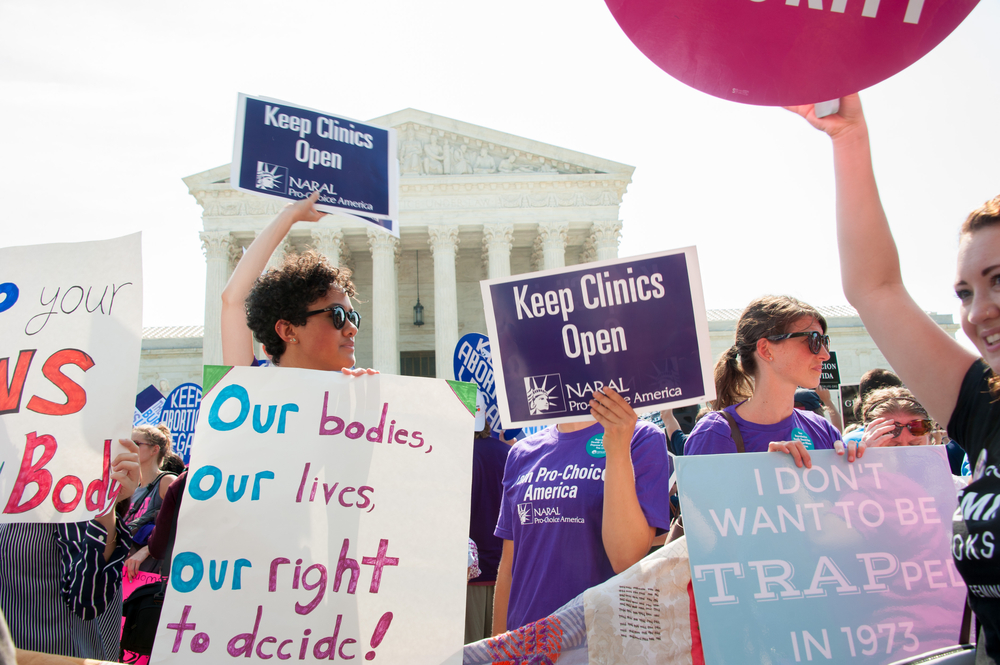In case you hadn’t noticed, it’s a pretty terrifying time to have a uterus. Not only are we looking ahead to the near-future IRL horror movie in which Donald Trump has the ability to nominate aggressively anti-choice Supreme Court Justices, but a number of states already have severely limited access and/or require a waiting period and counseling before a woman can seek an abortion.
Now, counseling prior to a medical procedure might not sound like that awful of an idea—if only so much of that counsel weren’t based in total misinformation.
For example (according to the Journal of the American Medical Association’s findings):
—Five states (and Vice President-elect Mike Pence, by the way) still espouse the debunked myth that abortion raises the risk of breast cancer.
—12 states erroneously tell women that the fetus feels pain during an abortion.
—Six states tell women seeking an abortion that life begins at the moment of conception.
Not to mention:
—27 U.S. states require a waiting period before being granted access to abortion services. (That’s 17 more than have a waiting period to buy a gun, by the way.)
—25 states restrict access to abortions through private insurance.
For decades (or seemingly forever), lawmakers and pro-life activists have tried to sell us on the necessity of misinformation like all the above because, as they love to tell us, abortion is a traumatizing event that will forever change a woman, scarring her for life. Which, of course, is total bull.
Now, yes, this kind of procedure can have a profound effect on the woman undergoing it, but a new study released last week has evidence that trauma is in no way a given, and the presumption that abortion damages a woman is actually more detrimental to her health. For this “Turnaway Study,” 956 women who sought abortions were interviewed 11 times each. The first interview was one week after their procedure or being turned away from the procedure, and then again every six months for five years. The study looked at the mental health effects (anxiety, depression, self-esteem, and “life satisfaction”) on women who had abortions and those who didn’t, as well as those who received first trimester abortions and those who had the procedure later.
The study also did what very few others—specifically those from which the misinformation given in counseling was taken—and looked at the mental health of the women before they became pregnant, not just after. And when all things were equal, the findings were, well, overwhelmingly equal.
One author of the study, a social psychologist researcher named M. Antonia Biggs, told the New York Times that most people
would expect the women who have an abortion to have increasing depression and anxiety over time, but instead we don’t see that … women denied an abortion have more anxiety, lower self-esteem, less life satisfaction than women who are able to get an abortion. But by six months to a year, they’re similar to women who had an abortion.
And then there is perhaps the most interesting finding of the study, albeit one that Biggs describes as perhaps not “very pro-choicey,” because we like to be able to dilute our science down to bite-sized absolutes. Pro-life lawmakers want to know for sure that abortions lead to depression. Believers in choice want a study that shows a lack of access to safe abortions is damaging to women’s mental health. How are we supposed to indulge our kneejerk reactions when the findings tell us that women hurt, and then they heal? That when a woman is denied autonomy over her own body, yes, she’s going to experience heightened anxiety and lower self-esteem but that after a year, she, statistically speaking, is likely to have similar mental health to a woman who had an abortion?
Sure, maybe that can be read by some as not 100% “pro-choicey,” because the study didn’t find that denying women access to abortion services are irreparably damaged for life. Instead, these findings are so much more encouraging than that. They tell us that women are, as Biggs herself put it, incredibly “resilient and adaptive,” under either circumstance (which is pretty “pro-choicey,” as far as we’re concerned).
In other words:

These findings are complicated, and fascinating (and you can read the full study here), and no matter how clearly, offensively false the links between abortion and permanent, unavoidable trauma already were, it’s good to have a little science backing that up.
(via NYT, image via Shutterstock)
Want more stories like this? Become a subscriber and support the site!
—The Mary Sue has a strict comment policy that forbids, but is not limited to, personal insults toward anyone, hate speech, and trolling.—
Follow The Mary Sue on Twitter, Facebook, Tumblr, Pinterest, & Google+.










Published: Dec 15, 2016 12:39 pm